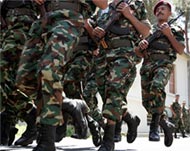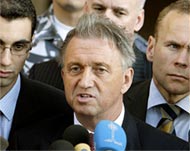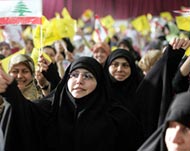Interview: Naim Qassem
Since the UN Security Council adopted Resolution 1559 last year, calling for Lebanese and non-Lebanese militia to disband, pressure on Hizb Allah to disarm has mounted.

But, Naim Qassem, Deputy Secretary-General of the Lebanese resistance group, has long argued that his organisation has valid reasons for its position on keeping weapons.
Qassem, a founding member of the group in 1982, talks to Aljazeera.net about whether his organisation’s latest political alliances will help Hizb Allah keep arms, shares his views on foreign influence on his country and discusses his party’s plans for the future.
Aljazeera.net: Is Hizb Allah confident it will keep its arms after you and your allies won the sweeping majority in Lebanon’s parliamentary elections?
Naim Qassem: The alliances we have forged with others are not only electoral alliances. They are political alliances. One of the points we have agreed upon politically with our allies is to protect the resistance and to reject UN Resolution 1559.
We have agreed to prepare the ground for domestic dialogue that would lead to conclusions [on the issue of keeping Hizb Allah’s arms] that are in harmony with our vision and our allies’ vision without the interference of any foreign party.
Based on that, we believe that the majority of the new parliament will take into consideration the Lebanese domestic debate and the Lebanese decision. And it will not consider Resolution 1559, which has an international umbrella, or the steps that directly serve the Israeli project.
So, do you feel confident that the new parliament will support Hizb Allah’s decision to keep its arms?
We expect the parliament to support Hizb Allah’s armament, but I cannot talk about total confidence in this issue. Such total secure feeling comes only after the actions are done. But things are going on a positive track till now.
 |
|
Druze leader Walid Jumblatt has |
Shortly after former prime minister Rafiq al-Hariri was killed, your ally Druze leader Walid Jumblatt raised fears that your arms could be directed against internal parties in Lebanon after Hizb Allah leader Hasan Nasr Allah attended the pro-Syrian Ain al-Tineh meeting. How can you trust that he and his parliamentary bloc will continue to support you?
We have to take into consideration all the political statements made. We have to examine the objective circumstances which led to such a statement being made. We cannot judge one political statement that was made during a time of high tension.
You only focused on one remark made by Mr Jumlatt and that remark was negative and made during a tense period. You did not focus on all his other remarks before and after that statement. He has always asserted his support to the resistance, saying he is willing to contribute to it and reinforce its armament.
The understanding we made afterwards between [Jumblatt’s] Progressive Socialist Party and Hizb Allah cancelled all the positions made in Ain Tineh and all the positions made in [the anti-Syrian gathering known as] Bristol. We are now before a new stage that requires new stands. That is why that statement has no value now, because it was made under different circumstances and was said only once.
Your other ally Saad al-Hariri, son of Rafiq al-Hariri, has good relations with the United States and France. Although he has said he supports Hizb Allah in keeping its arms, he has told Western media, like The Washington Post and Newsweek, that he would hold disarmament negotiations with Hizb Allah until they give up their arms. How do you feel about such inconsistency in his statements?
We care about the agreements we made with him and we care much less about the phrasing of terms which could be open to different interpretations.
What he said is that the issue will be solved through domestic dialogue and that is in conformity with our demands. But to where we will reach in this dialogue is another issue.
He is expecting that the dialogue will reach this conclusion [that Hizb Allah will be convinced to disarm]. This way of looking at it could not be realistic.
What we care about are the clear statements and agreements that have confirmed the protection of the resistance and the open domestic debate for all issues that need to be solved. Keeping Hizb Allah’s arms is one such issue.
When you refer to the agreements, are you talking about the understandings between Hizb Allah, Jumblatt’s Progressive Socialist Party and al-Hariri’s Future Movement?
Of course, we have agreed on these issues with Mr Saad al-Hariri and Mr Jumblatt. This is not a secret.
 |
|
Since Syria’s withdrawal, the US |
Why has Hizb Allah warned that US-French guardianship of Lebanon could replace Syrian guardianship?
After the Syrian evacuation of Lebanon, it became clear that there was a wide American-French interest in the country. Their ambassadors began discussing all Lebanese domestic affairs, including the elections in villages, potential winners and number of votes, and how much each list would get. They even interfered in forming coalitions and alliances between the parties. This is a shameful and sad thing.
That is why we consider ourselves in a confrontation with foreign interference. But I hope that some Lebanese, who have become prisoners of such interference, would wake up and realise that such a situation would harm the Lebanese domestic situation and would lead to complications that we do not need.
When you talk about foreign interference in forming coalitions, are you referring to alleged US pressure that led to the inclusion of Solange Gemayel [widow of radical Christian President Bashir Gemayel] in al-Hariri’s list in the Beirut elections?
In one of the incidents where they interfered and succeeded was their choosing of Solange Gemayel in Beirut. And one thing they did not succeed in was their attempt to bring together [Christian leader] General Michel Aoun and Walid Jumblatt in an alliance in [Mount Lebanon’s] Baabda-Aley [district] as well as other alliances in that area.
Therefore, they do work. But they fail in some places and succeed in others. We criticise interferences whether they are positive or negative because interferences as such will make us prisoners of their guidance and opinions.
|
“They are also blackmailing Lebanon in order to implement UN Resolution 1559 and linking donations to that” |
Many people have read about the meeting [earlier this month] that was held in Paris for the ambassadors of different states headed by the US and France. This meeting discussed the Lebanese file as if it was a government making appropriate decisions.
They spoke of reform, but then talked about names and details and such a thing is nothing but interference.
They can talk about reform, but to delve into details is a catastrophe.
They are also blackmailing Lebanon in order to implement UN Resolution 1559 and linking donations to that.
We have ahead of us a harsh and continuous interference. The American president and his secretary of state keep talking about Lebanon to an extent that has become intolerable.
 |
|
UN envoy Terje Roed-Larsen said |
Before the legislative polls, Jumblatt said publicly that UN special envoy to the Middle East Terje Roed-Larsen insisted that elections must take place as scheduled. Do you not think such foreign interference was positive?
There is some response to international interference in some details, such as the date of the elections. I cannot say that we reached the stage that made Lebanon hostage to such foreign interference. We are still in the very beginning. And before it’s too late, we call upon concerned people to prevent a huge foreign influence on Lebanon.
Lebanon is not isolated from the world and sometimes it cannot oppose certain international conditions. But this does not mean we have to be dictated in what we do and give up our fixed stands.
Our fixed stands must be a red line. That’s why when we reject UN Resolution 1559, we do so because we believe that Lebanon is primarily a Lebanese responsibility. Protecting the country is the responsibility of the army and the people and, therefore, the resistance is a domestic issue.
That’s why an international resolution calling for the disarmament of Hizb Allah is interference in domestic affairs and is an award granted to Israel.
Hizb Allah announced that it is seriously considering taking part in the new government. To what extent does Hizb Allah need such participation, especially as international pressure is mounting on it to disarm?
I cannot hide that the Syrian evacuation of Lebanon made us lose a political protection for the resistance, which is facing international challenges and some domestic challenges as well.
We have to act by filling this gap and we have to rely on ourselves to provide the protection.
And since the mission of the upcoming Lebanese government is to secure a transitional period for the country and lay its foundations, our participation in the new government will be influential in shaping its policy.
This will put us closer to administering the country with our partners rather than being on the receptors’ end that could lead to a situation in which our voices would go unheard.
In case of a military strike on Iranian nuclear facilities by Israeli or American forces, what would Hizb Allah’s role be, especially that Hizb Allah shares the same ideology with Iran and is supported by the Islamic republic?
 |
|
Hizb Allah is independent with its |
I believe that any American or Israeli attack against the peaceful Iranian nuclear facilities will be a big mistake and will lead to huge reactions.
Iran possesses rockets that enable it to defend itself. It does not need anybody to stand up for it.
Was it not for these rockets that can reach the heart of Tel Aviv, Israel would have attacked the Iranian facilities a long time ago just as it attacked Iraq’s [Osirak facilities in 1981].
The fear of Iran’s reaction is the reason that has prevented Israel from attacking the Islamic republic, especially that there is not only one facility.
Therefore, there is a balance of terror and Iran is able through this balance of terror to achieve its goals in preventing such attacks and in retaliating if these attacks occur. So, there is no need for any other party.
Not even Hizb Allah?
No need for any other party.
OK, but are Hizb Allah’s objectives restricted only to Lebanon or do they go beyond that to defend the interests of Iran, which supports Hizb Allah, shares its ideology and Hizb Allah’s supreme leader Ali Khamenei is the same supreme leader of Iran?
Hizb Allah defends its own convictions and views and does not defend others. When it defends its convictions, it does so because it is an independent entity that has its own leader and aspirations; it is not subordinate to anyone.
The Iran-backed Badr Brigades are very effective in the political process in Iraq and are cooperating with the US occupation administration with an Iranian approval. Why doesn’t Hizb Allah, which is also supported by Iran, cooperate with the United States?
Every country and every organisation takes its own choices. Badr Brigades is an Iraqi organisation that has its leaders and its coordinating framework with neighbouring states, like Iran or Saudi Arabia or other states. And we are not in charge of the choices they make. And it is not required from us to imitate what they have done in their country or they imitate what we have done here.
They know more than us what to do in their own country. We are in a different area and have different leadership. Every organisation has its own characteristics.
Yes, but Badr Brigades, Hizb Allah and Iran share the same ideology and Iran supports Badr Brigades just as it supports Hizb Allah.
Iran supports many liberation movements and this issue does not oblige the movements to take similar paths. It is for each organisation to take the path that fits the circumstances under which it is operating.
We have our convictions and circumstances in Lebanon and we operate based on them. We do not abide by the rules of other organisations even if we have similar convictions and a similar Islamic vision. But when it comes to the implementation of details and politics, each country has its own characteristics and each organisation has its own features.